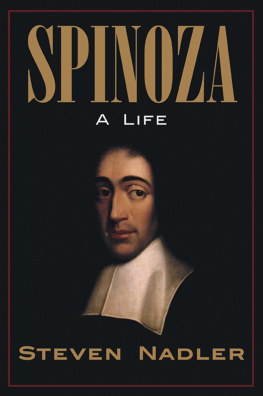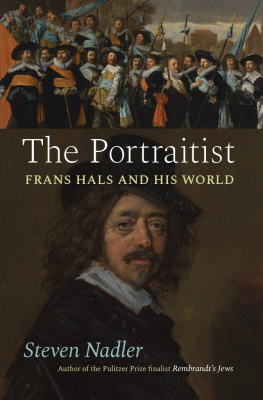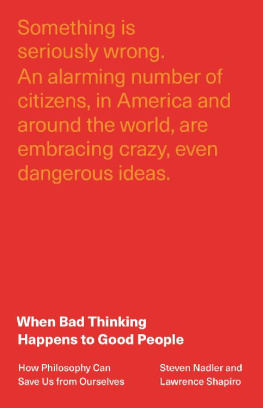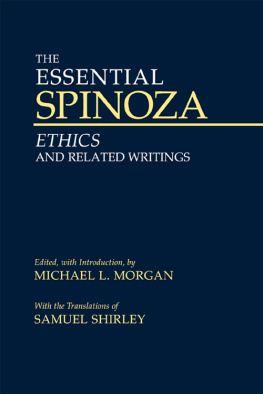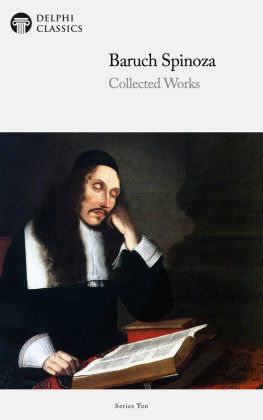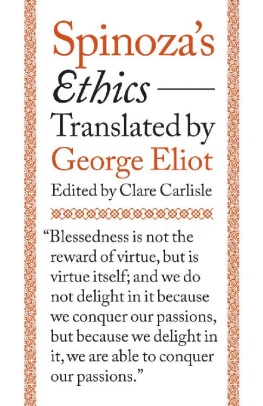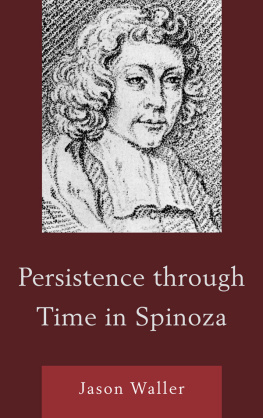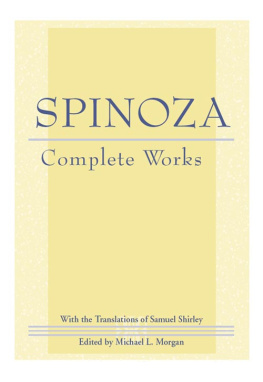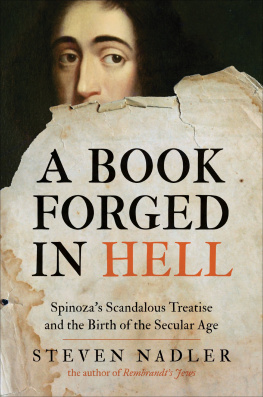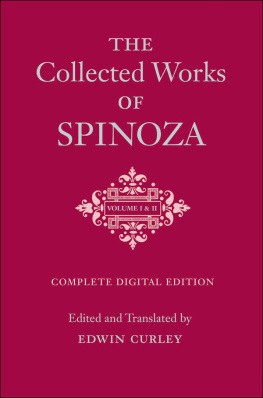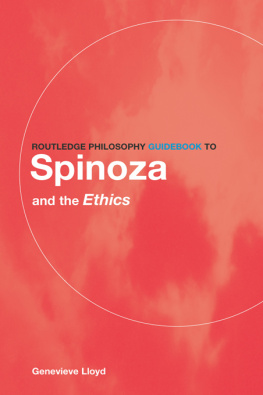Steven Nadler - Spinoza
Here you can read online Steven Nadler - Spinoza full text of the book (entire story) in english for free. Download pdf and epub, get meaning, cover and reviews about this ebook. year: 1999, publisher: Cambridge University Press, genre: Home and family. Description of the work, (preface) as well as reviews are available. Best literature library LitArk.com created for fans of good reading and offers a wide selection of genres:
Romance novel
Science fiction
Adventure
Detective
Science
History
Home and family
Prose
Art
Politics
Computer
Non-fiction
Religion
Business
Children
Humor
Choose a favorite category and find really read worthwhile books. Enjoy immersion in the world of imagination, feel the emotions of the characters or learn something new for yourself, make an fascinating discovery.
- Book:Spinoza
- Author:
- Publisher:Cambridge University Press
- Genre:
- Year:1999
- Rating:4 / 5
- Favourites:Add to favourites
- Your mark:
- 80
- 1
- 2
- 3
- 4
- 5
Spinoza: summary, description and annotation
We offer to read an annotation, description, summary or preface (depends on what the author of the book "Spinoza" wrote himself). If you haven't found the necessary information about the book — write in the comments, we will try to find it.
Spinoza — read online for free the complete book (whole text) full work
Below is the text of the book, divided by pages. System saving the place of the last page read, allows you to conveniently read the book "Spinoza" online for free, without having to search again every time where you left off. Put a bookmark, and you can go to the page where you finished reading at any time.
Font size:
Interval:
Bookmark:
SPINOZA
Baruch Spinoza (163277) was one of the most important philosophers of all time; he was also, arguably, the most radical and controversial. Born into a Portuguese Jewish merchant family living in Amsterdam, Spinoza was banished from the Sephardic community as a young man, apparently for his heretical views. He devoted the rest of his life to the search for truth, freedom, and moral well-being. He also pursued his vision of true religion and of the secular, tolerant state.
This is the first complete biography of Spinoza in any language and is based on detailed archival research. More than simply recounting the story of Spinozas life, the book takes the reader into the heart of Jewish Amsterdam in the seventeenth century and, with Spinozas exile from Judaism, also into the midst of the tumultuous political, social, intellectual, and religious world of the young Dutch Republic.
Although the book will be an invaluable resource for philosophers, historians, and scholars of Jewish thought, it has been written for any member of the general reading public who has a serious interest in philosophy, Jewish history, seventeenth-century European history, or the culture of the Dutch Golden Age.
Steven Nadler is Professor of Philosophy and a member of the faculty of the Center for Jewish Studies at the University of Wisconsin at Madison.
Spinoza
A Life
Steven Nadler

CAMBRIDGE UNIVERSITY PRESS
Cambridge, New York, Melbourne, Madrid, Cape Town, Singapore,
So Paulo, Delhi, Dubai, Tokyo, Mexico City
Cambridge University Press
32 Avenue of the Americas, New York NY 10013-2473, USA
www.cambridge.org
Information on this title: www.cambridge.org/9780521552103
Cambridge University Press 1999
This publication is in copyright. Subject to statutory exception and to the provisions of relevant collective licensing agreements, no reproduction of any part may take place without the written permission of Cambridge University Press.
First published 1999
Reprinted 1999
First paperback edition 2001
12th printing 2009
A catalogue record for this publication is available from the British Library.
ISBN 978-0-521-55210-3 Hardback
ISBN 978-0-521-00293-6 Paperback
Cambridge University Press has no responsibility for the persistence or accuracy of URLs for external or third-party internet websites referred to in this publication, and does not guarantee that any content on such websites is, or will remain, accurate or appropriate. Information regarding prices, travel timetables, and other factual information given in this work is correct at the time of first printing but Cambridge University Press does not guarantee the accuracy of such information thereafter.
for my family
Contents
Acknowledgments
No project such as this can be accomplished without a great deal of help. I have asked for a lot of favors over the past few years, and at this point all I can do is express my thanks to various individuals and institutions for their services, generosity, support, and friendship. Maybe Ill also give them a free copy of the book.
First of all, I am enormously grateful to Jonathan Israel, David Katz, Marc Kornblatt, Donald Rutherford, Red Watson and especially Pierre-Franois Moreau, Wim Klever, Piet Steenbakkers, and William Klein for reading through the entire manuscript and providing copious comments on matters of both substance and style. Their suggestions, corrections, and criticisms were essential in moving this book from its early drafts to a publishable form.
I also thank a number of people who read individual chapters, steered me to the right sources, responded to my queries, lent me material that they owned, looked things up, ran local and international errands, or just provided much-needed encouragement: Fokke Akkerman, Amy Bernstein, Tom Broman, Ed Curley, Yosef Kaplan, Nancy Leduc, Tim Osswald, Richard Popkin, Eric Schliesser, and Theo Verbeek. I would especially like to give my thanks to the director of the Bibliotheca Rosenthaliana of the University of Amsterdam, Adri Offenberg, who was most kind in resolving a number of my perplexities about the Amsterdam Portuguese-Jewish community in the seventeenth century. Finally, Henriette Reerink was a perfect friend and an indispensable assistant in Amsterdam. Besides finding me a bicycle to use, she hunted down some important records at the Municipal Archives and helped me navigate my way, under glorious Dutch skies, to the cemetery at Ouderkerke. She also knows where to find the best poffertjes in town.
Work on this book was supported by a summer stipend from the National Endowment for the Humanities, by a research fellowship from the Romnes Foundation, and by a number of summer research grants from the Graduate School of the University of WisconsinMadison. I also benefited from a years sabbatical from the University of Wisconsin, for which I am enormously grateful.
Some of the material from on the reasons behind Spinozas excommunication was presented to audiences at University College, London; the University of Chicago; and the History of Science Department and the Logos Society of the University of WisconsinMadison. I am grateful for the invitations to speak, and especially to Martin Stone in London, and for the comments and suggestions that I received on those occasions.
And then there are those to whom this book is dedicated, whose love and support kept me going: my wife, Jane, and my children, Rose and Benjamin; my parents, Arch and Nancy; my brother, David, and my sisters, Lauren and Linden. I owe you more than words could ever express.
Preface
Baruch de Spinoza (163277) was the son of a prominent merchant in Amsterdams Portuguese-Jewish community. He was also among the more gifted students in its school. But something happened around his twentythird year whether it was sudden or gradual, we do not know that led to the harshest excommunication ever proclaimed by the leaders of the Amsterdam Sephardim. The result was Spinozas departure from the community indeed, from Judaism entirely. He would go on to become one of the most important and famous philosophers of all time, and certainly the most radical and controversial of his own.
The young mans transformation (if thats what it was) from ordinary Jewish boy living, to all appearances, a perfectly normal orthodox life and remarkable perhaps only for his intelligence to iconoclastic philosopher is, unfortunately, hidden from us, possibly forever. We have only the cherem document, full of oaths and maledictions, that was composed by the communitys governors. There is so little surviving material, so little that is known for certain about the details of Spinozas life, particularly before 1661 (when his extant correspondence begins), that we can only speculate on his emotional and intellectual development and on the more mundane matters that fill out a persons existence. But what a rich field for speculation it is, particularly given the fascination of its subject.
Metaphysical and moral philosopher, political and religious thinker, biblical exegete, social critic, grinder of lenses, failed merchant, Dutch intellectual, Jewish heretic. What makes Spinozas life so interesting are the various, and at times opposing, contexts to which it belongs: the community of Portuguese and Spanish immigrants, many of them former marranos, who found refuge and economic opportunity in the newly independent Dutch Republic; the turbulent politics and magnificent culture of that young nation which, in the middle of the seventeenth century, was experiencing its so-called Golden Age; and, not the least, the history of philosophy itself.
Next pageFont size:
Interval:
Bookmark:
Similar books «Spinoza»
Look at similar books to Spinoza. We have selected literature similar in name and meaning in the hope of providing readers with more options to find new, interesting, not yet read works.
Discussion, reviews of the book Spinoza and just readers' own opinions. Leave your comments, write what you think about the work, its meaning or the main characters. Specify what exactly you liked and what you didn't like, and why you think so.

